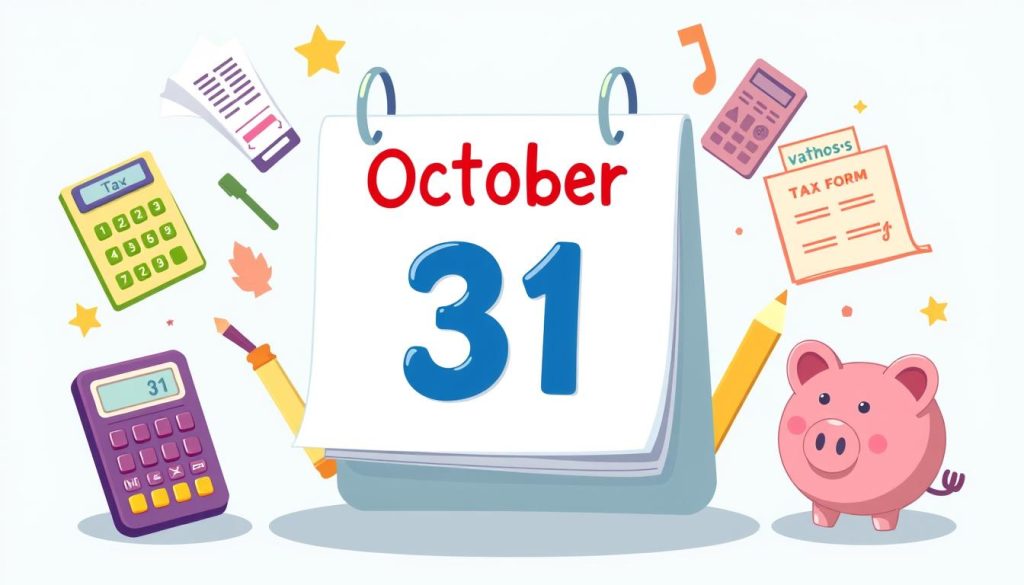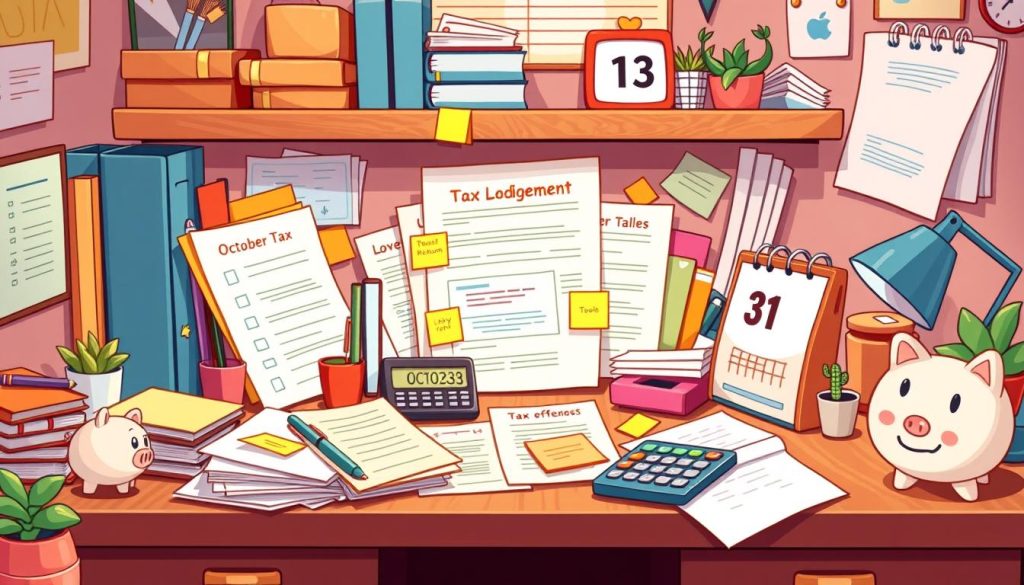With the October 31 Individual tax deadline near, it’s time to sort out your finances. This important date is when you must lodge your personal income tax return with the ATO. Many Aussies need to submit their tax returns by then to avoid trouble with the Australian Taxation Office.
Knowing your tax duties is key to avoiding fines and getting the most refund. Whether you’re a pro at taxes or new to it, keeping up with the October 31 deadline is crucial for a hassle-free tax season.
Key Takeaways
- October 31 is the standard deadline for personal income tax returns
- Timely lodgement helps avoid ATO penalties
- Self-lodging taxpayers must meet the October 31 due date
- Tax agents may have extended lodgement timeframes
- Preparing early ensures a stress-free tax return process
Understanding the October 31 Individual Tax Deadline
The October 31 tax return lodgement deadline is very important for Australian taxpayers. It’s vital to know your taxpayer duties and why meeting this ATO due date matters.
Who Needs to Lodge by This Date?
Most individual taxpayers must lodge their tax returns by October 31. This includes:
- Employees with straightforward tax affairs
- Self-employed individuals with simple business structures
- Investors with basic income from shares or property

Importance of Meeting the ATO Due Date
On time tax return lodgement is key. It helps you:
- Avoid late lodgement penalties
- Get tax refunds quickly
- Keep good standing with the ATO
Exceptions to the October 31 Deadline
Some taxpayers have different deadlines:
| Category | Deadline |
|---|---|
| Registered tax agent clients | May 15 (following year) |
| Individuals with complex affairs | Varies (consult ATO) |
| First-time lodgers | October 31 or later (check with ATO) |
It’s important to understand your specific taxpayer duties to meet ATO deadlines. If you’re unsure about your tax return lodgement needs, check the ATO website or talk to a registered tax professional.
Preparing Your Personal Income Tax Return
Preparing your personal income tax return can seem overwhelming. But with the right steps, you can make it easier and possibly get a bigger refund. Let’s explore some important steps to help you get ready.

First, collect all your financial documents. This includes payment summaries, bank statements, and receipts for work-related expenses. Having these ready will save you time and reduce stress when filling out your return.
Then, learn about the latest tax deductions. The Australian Taxation Office (ATO) updates these often. It’s good to check what you can claim. Common deductions include work-related travel, home office expenses, and costs for professional development.
- Review your income sources
- Collect receipts for potential deductions
- Check for any tax offsets you might be eligible for
Think about tax planning strategies to improve your return. This could mean prepaying some expenses or making extra super contributions. Just remember, these plans should fit with your financial goals.
“Effective tax planning is not about avoiding taxes, but about making informed decisions to manage your tax obligations efficiently.”
If you’re not sure about anything in your tax return, get professional help. A tax agent can offer valuable advice and help you claim all the deductions you’re eligible for.
Key Documents and Information Required for Lodgement
Getting ready for your tax return means collecting important documents and info. This makes sure your personal income tax is right and you get the most from your deductions.
Income Statements and Payment Summaries
Get all income statements from your jobs. These show how much you earned, taxes taken out, and super contributions. If you’ve had different jobs, get payment summaries from each.
Deduction Receipts and Records
Save receipts for work-related costs, donations, and other tax deductions. Organize them by type to make your tax return easier.
Investment and Rental Property Information
If you have investments or rental properties, gather the right documents. This includes dividend statements, interest, and property expense records.

| Document Type | Purpose | Source |
|---|---|---|
| Income Statement | Report earnings and tax withheld | Employer |
| Payment Summary | Show income from previous jobs | Former employers |
| Deduction Receipts | Claim work-related expenses | Your records |
| Investment Statements | Report investment income | Banks, brokers |
| Rental Property Records | Declare rental income and expenses | Your records, property manager |
Having these documents ready will help you fill out your tax return correctly. This way, you can claim all the deductions you’re eligible for and report all your income.
Common Tax Deductions to Maximise Your Return
Understanding tax deductions is key to getting the most out of your taxes. Many Aussies miss out on savings by not knowing about common deductions. Let’s look at some areas where you might find tax benefits you didn’t know about.
Work-related expenses are a big part of tax deductions. This includes things like uniforms, tools, and even expenses for working from home. Make sure to keep records of these costs all year to avoid missing out.
Self-education costs can also be claimed if they’re for your current job. This includes course fees, textbooks, and travel to classes or exams.
Don’t forget about charitable donations. Giving to registered charities can be deducted from your taxes. So, keep those receipts!
“Effective tax planning strategies involve understanding and utilising all available deductions to minimise your tax liability legally.”
Here’s a quick reference table of some commonly overlooked tax deductions:
| Category | Examples |
|---|---|
| Work-related | Uniforms, protective gear, work-specific subscriptions |
| Home office | Internet, electricity, office furniture |
| Vehicle expenses | Fuel, maintenance for work-related travel |
| Investment-related | Financial advisor fees, investment magazines |
Remember, tax planning is different for everyone. It’s smart to talk to a tax expert. They can help you claim all the deductions you’re eligible for while making sure you follow ATO rules.
Consequences of Missing the Tax Return Lodgement Deadline
Missing the tax return deadline by October 31 can cause big problems. The Australian Taxation Office (ATO) doesn’t like late lodgements. This can lead to fines and other issues.
Late lodgement penalties
The ATO might fine you for late lodgement. These fines start at $222 for every 28 days late. They can go up to $1,110. Plus, you’ll still have to pay any tax you owe.
Interest charges on unpaid tax
If you don’t pay tax on time, the ATO charges interest. This interest grows every day. It makes your tax debt bigger over time.
Potential loss of government benefits
Being late with your tax return can also hurt your government benefits. You might miss out on family tax benefits or childcare subsidies. To avoid this, get help from a tax agent. They can make sure your return is on time and correct. For expert help, contact Kingsman Accountants at info@kingsmanaccountants.com.
FAQ
Who needs to lodge a tax return by October 31?
In Australia, anyone who made money last year and has to file a tax return must do so by October 31.
Why is it important to meet the ATO’s October 31 deadline?
It’s crucial to meet the deadline to follow tax laws. This avoids fines and extra charges for late filing.
Are there any exceptions to the October 31 deadline?
Yes, some people with complex tax situations or those using tax agents might get more time.
What documents and information are required for lodging a personal income tax return?
You’ll need income statements, payment summaries, and receipts for deductions. Also, details on investments and rental properties are important.
What are some common tax deductions to maximise my return?
Deductions include work expenses, education costs, and other eligible items. A tax expert can help find all your deductions.
What are the consequences of missing the tax return lodgement deadline?
Missing the deadline can lead to penalties, interest on unpaid tax, and loss of government benefits.
How can I ensure timely and accurate tax return lodgement?
Getting help from a registered tax agent like Kingsman Accountants can ensure your return is on time and correct. They also help find deductions and reduce your tax bill.